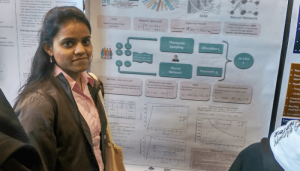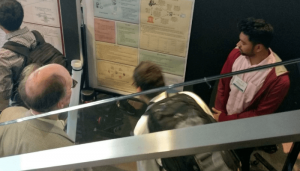Analysing or modelling strategic interactions between rational decision-makers is Prof. Sujit Gujar’s forte. With specific research interests in the application of game theory to artificial intelligence (AI) and blockchain technology, it comes as no surprise that Prof. Gujar has been regularly attending the prestigious conference on Autonomous Agents and Multi Agent Systems (AAMAS). Here’s a brief look at what the IIITH’s Machine Learning Lab presented at the 2019 AAMAS.
It was in 2002 that the AAMAS conference was born out of the merger of three major international conferences, namely the International Conference on Autonomous Agents (AGENTS), the International Conference on Multi-Agent Systems (ICMAS) and the International Workshop on Agent Theories, Architectures and Languages (ATAL). As a premier conference, it invites and attracts respected academicians to discuss research in these areas. The 2019 AAMAS conference was held in May in Montreal where Prof. Gujar and his students presented three papers. Two of them were related to applications of blockchain technology.

Preserving Privacy
“I am excited about designing algorithms for modern marketplaces and making them strategy-proof, that is, in such a way that strategic agents cannot manipulate them”, says Prof. Gujar. Citing the example of how traditional auctions typically take place with the auctioneer knowing everyone’s bids, he says that they have developed some protocols which can conduct auctions over blockchains, guaranteeing privacy of the bids as well as the privacy of agents. This is especially useful in the case of businesses dealing with sensitive information. Thus if there are multiple items being bid for, except winners, no one else will know who (was bidding) and which other items were being bid for. The paper, A Truthful, Privacy-Preserving, Approximately Efficient Combinatorial Auction For Single-minded Bidders, authored by Sankarshan Damle (researcher from the Machine Learning Lab), Dr. Boi Faltings (Full Professor, Artificial Intelligence Laboratory, EPFL), and Prof. Gujar,talks at length about such a cryptographic solution proposed by the team that can be scalable and used to develop a blockchain application.
E-governance and civic crowdfunding
With blockchain technology finding its uses in the development of e-Governance that involves safe and secure transmission of data and citizen databases, the second paper proposes a novel mechanism that can be used in crowdfunding of civic projects. Titled Aggregating Citizen Preferences for Public Projects Through Civic Crowdfunding, the paper authored by Sankarshan Damle and Moin Hussain Moti, researchers from the Machine Learning Lab, Praphul Chandra (KoineArth, Bangalore), and Prof. Gujar, proposes a mechanism where the Government can take an informed and better decision by overcoming manipulation of citizens’ preferences. Current mechanisms consider only positive valuations ignoring the preferences of the majority which could include negative valuations too. “In Economics, there are a lot of mechanisms with nice theoretical properties but which are very difficult to implement. We are trying to design mechanisms which will be easy to implement and which we can take forward,” says Prof. Gujar of the paper.

Sponsored Search Auctions
The third paper which was presented is in the area of designing sponsored search auctions, something that Prof. Gujar has been working on and refined since his doctoral thesis. Search engines display various ads on their sites whenever there is a search. Display of these ads occurs through auctions, known as sponsored search auctions. In such auctions, the advertisers pay only if their ad receives a click. Thus, the probabilities of clicks, click through rates (CTRs) play an important role in designing sponsored search auctions. However, typically, neither search engine nor the advertisers know the CTRs before hand. The search engine can learn the CTRs by displaying the ads from various advertisers over repeated auctions. With the combination of game theory and machine learning, the researchers propose to overcome such manipulations of the agents. The paper titled Thompson Sampling Based Multi-Armed-Bandit Mechanism Using Neural Networksproposed the use of neural networks to design an optimal payment scheme that can be used in such auctions. While online advertisement or crowdsourcing for recruitment of quality workers are just some examples where the research finds application, Prof. Gujar says that the paper is actually designed for any abstract setting where there are few parameters to be learned (such as CTRs) and few parameters to be reported (such as bids) by the manipulative agents. The paper was authored by MS student Padala Manisha and Dr. Gujar.




Next post